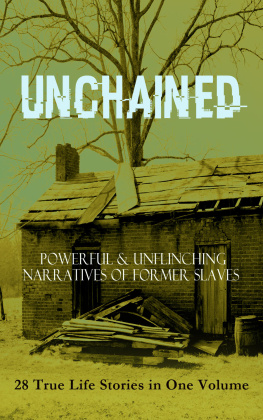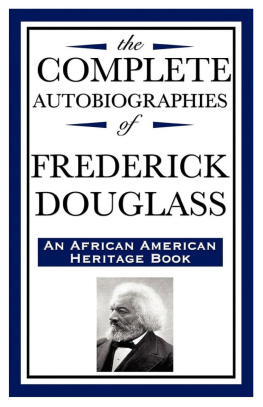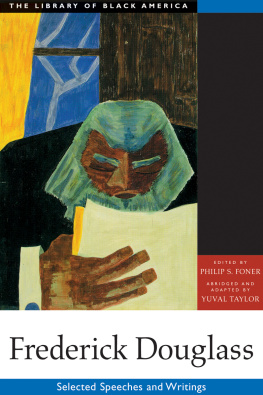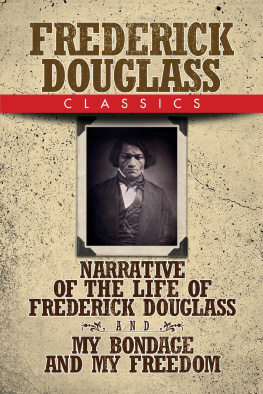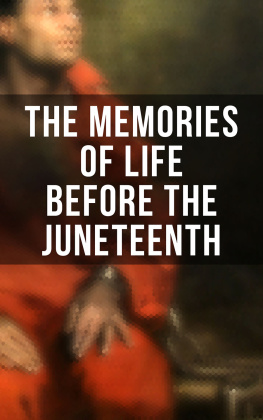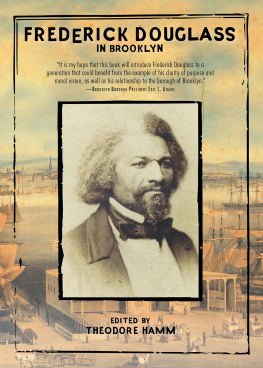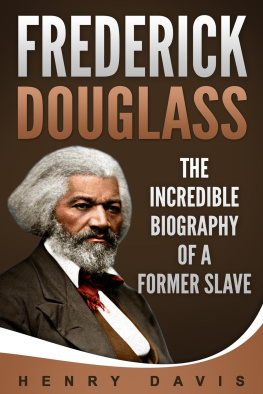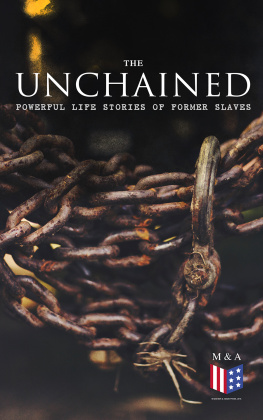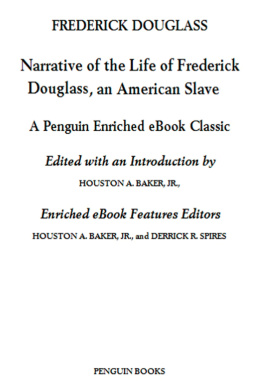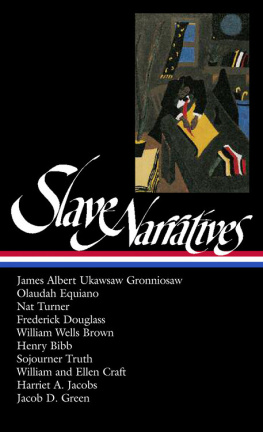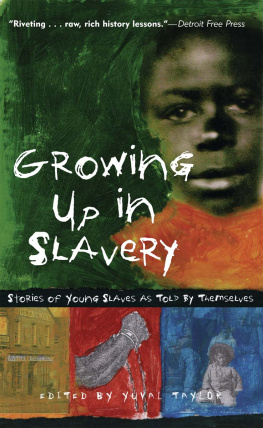Table of Contents
Frederick Douglass, Solomon Northup, Willie Lynch, Nat Turner, Sojourner Truth, Harriet Jacobs, Mary Prince, William Craft, Ellen Craft, Louis Hughes, Jacob D. Green, Booker T. Washington, Olaudah Equiano, Elizabeth Keckley, William Still, Sarah H. Bradford, Josiah Henson, Charles Ball, Austin Steward, Henry Bibb, L. S. Thompson, Kate Drumgoold, Lucy A. Delaney, Moses Grandy, John Gabriel Stedman, Henry Box Brown, Margaretta Matilda Odell, Thomas S. Gaines, Brantz Mayer, Theodore Canot, Daniel Drayton, Thomas Clarkson, F. G. De Fontaine, John Dixon Long, Stephen Smith, Joseph Mountain, Ida B. Wells-Barnett, Lydia Maria Child, William Wells Brown
UNCHAINED - Powerful & Unflinching Narratives Of Former Slaves: 28 True Life Stories in One Volume
e-artnow, 2017
Contact:
ISBN 978-80-268-7416-4
Narrative of the Life of Frederick Douglass, an American Slave (Frederick Douglass)
12 Years a Slave (Solomon Northup)
The Willie Lynch Letter: The Making of Slave! (Willie Lynch)
The Confessions of Nat Turner (Nat Turner)
DISTRICT OF COLUMBIA, TO WIT:
Be it remembered, That on this tenth day of November, Anno Domini, eighteen hundred and thirty-one, Thomas R. Gray of the said District, deposited in this office the title of a book, which is in the words as following:
"The Confessions of Nat Turner, the leader of the late insurrection in Southampton, Virginia, as fully and voluntarily made to Thomas R. Gray, in the prison where he was confined, and acknowledged by him to be such when read before the Court of Southampton; with the certificate, under seal, of the Court convened at Jerusalem, November 5, 1831, for his trial. Also, an authentic account of the whole insurrection, with lists of the whites who were murdered, and of the negroes brought before the Court of Southampton, and there sentenced, &c" the right whereof he claims as proprietor, in conformity with an Act of Congress, entitled "An act to amend the several acts respecting Copy Rights."
Edmund J. Lee , Clerk of the District.
In testimony that the above is a true copy,
from the record of the District Court for
(Seal.) the District of Columbia, I, Edmund J.
Lee, the Clerk thereof, have hereunto
set my hand and affixed the seal of my
office, this 10th day of November, 1831.
Edmund J. Lee , C.D.C.
TO THE PUBLIC.
The late insurrection in Southampton has greatly excited the public mind, and led to a thousand idle, exaggerated and mischievous reports. It is the first instance in our history of an open rebellion of the slaves, and attended with such atrocious circumstances of cruelty and destruction, as could not fail to leave a deep impression, not only upon the minds of the community where this fearful tragedy was wrought, but throughout every portion of our country, in which this population is to be found. Public curiosity has been on the stretch to understand the origin and progress of this dreadful conspiracy, and the motives which influences its diabolical actors. The insurgent slaves had all been destroyed, or apprehended, tried and executed, (with the exception of the leader,) without revealing any thing at all satisfactory, as to the motives which governed them, or the means by which they expected to accomplish their object. Every thing connected with this sad affair was wrapt in mystery, until Nat Turner, the leader of this ferocious band, whose name has resounded throughout our widely extended empire, was captured. This "great Bandit" was taken by a single individual, in a cave near the residence of his late owner, on Sunday, the thirtieth of October, without attempting to make the slightest resistance, and on the following day safely lodged in the jail of the County. His captor was Benjamin Phipps, armed with a shot gun well charged. Nat's only weapon was a small light sword which he immediately surrendered, and begged that his life might be spared. Since his confinement, by permission of the Jailor, I have had ready access to him, and finding that he was willing to make a full and free confession of the origin, progress and consummation of the insurrectory movements of the slaves of which he was the contriver and head; I determined for the gratification of public curiosity to commit his statements to writing, and publish them, with little or no variation, from his own words. That this is a faithful record of his confessions, the annexed certificate of the County Court of Southampton, will attest. They certainly bear one stamp of truth and sincerity. He makes no attempt (as all the other insurgents who were examined did,) to exculpate himself, but frankly acknowledges his full participation in all the guilt of the transaction. He was not only the contriver of the conspiracy, but gave the first blow towards its execution.
It will thus appear, that whilst every thing upon the surface of society wore a calm and peaceful aspect; whilst not one note of preparation was heard to warn the devoted inhabitants of woe and death, a gloomy fanatic was revolving in the recesses of his own dark, bewildered, and overwrought mind, schemes of indiscriminate massacre to the whites. Schemes too fearfully executed as far as his fiendish band proceeded in their desolating march. No cry for mercy penetrated their flinty bosoms. No acts of remembered kindness made the least impression upon these remorseless murderers. Men, women and children, from hoary age to helpless infancy were involved in the same cruel fate. Never did a band of savages do their work of death more unsparingly. Apprehension for their own personal safety seems to have been the only principle of restraint in the whole course of their bloody proceedings. And it is not the least remarkable feature in this horrid transaction, that a band actuated by such hellish purposes, should have resisted so feebly, when met by the whites in arms. Desperation alone, one would think, might have led to greater efforts. More than twenty of them attacked Dr. Blunt's house on Tuesday morning, a little before day-break, defended by two men and three boys. They fled precipitately at the first fire; and their future plans of mischief, were entirely disconcerted and broken up. Escaping thence, each individual sought his own safety either in concealment, or by returning home, with the hope that his participation might escape detection, and all were shot down in the course of a few days, or captured and brought to trial and punishment. Nat has survived all his followers, and the gallows will speedily close his career. His own account of the conspiracy is submitted to the public, without comment. It reads an awful, and it is hoped, a useful lesson, as to the operations of a mind like his, endeavoring to grapple with things beyond its reach. How it first became bewildered and confounded, and finally corrupted and led to the conception and perpetration of the most atrocious and heart-rending deeds. It is calculated also to demonstrate the policy of our laws in restraint of this class of our population, and to induce all those entrusted with their execution, as well as our citizens generally, to see that they are strictly and rigidly enforced. Each particular community should look to its own safety, whilst the general guardians of the laws, keep a watchful eye over all. If Nat's statements can be relied on, the insurrection in this county was entirely local, and his designs confided but to a few, and these in his immediate vicinity. It was not instigated by motives of revenge or sudden anger, but the results of long deliberation, and a settled purpose of mind. The offspring of gloomy fanaticism, acting upon materials but too well prepared for such impressions. It will be long remembered in the annals of our country, and many a mother as she presses her infant darling to her bosom, will shudder at the recollection of Nat Turner, and his band of ferocious miscreants.

